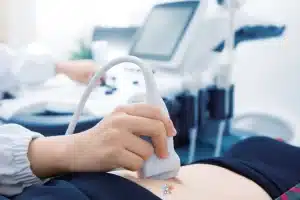by Jennifer Shakeel
 Most women have heard that once you give birth to your child, you may experience symptoms of depression, or what many refer to as the “baby blues”. Many believe this is caused by hormonal changes along with the adjustments of a newborn that needs care 24 hours a day seven days a week. Most women are sleep deprived and have little energy, which could contribute to symptoms of depression. It is important for women and their families to be aware of the signs and symptoms of a more serious condition, postpartum depression.
Most women have heard that once you give birth to your child, you may experience symptoms of depression, or what many refer to as the “baby blues”. Many believe this is caused by hormonal changes along with the adjustments of a newborn that needs care 24 hours a day seven days a week. Most women are sleep deprived and have little energy, which could contribute to symptoms of depression. It is important for women and their families to be aware of the signs and symptoms of a more serious condition, postpartum depression.
Postpartum depression, a depression diagnosed right after childbirth, is a serious illness that affects a woman’s ability to complete every day tasks and can cause them to become despondent. Not only does the inability to care for her own personal needs, she begins to become unable to care for her baby, and to meet other family members needs. During a woman’s pregnancy, the female hormones estrogen and progesterone are at increased levels. Within the first 24 hours after giving birth, these hormone levels rapidly return to normal. Many researchers believe that this huge decrease in hormone levels may be the leading cause of depression.
Another hormone level could also contribute to symptoms of depression. A small gland in the neck, known as the thyroid, that produces hormones may also have a drop in secretions upon giving birth. This hormone helps your body regulate the use and storage of energy from food. If the levels drop to low, this could lead to symptoms that are similar to depression. This is easily detected by a simple blood test and can be controlled quite easily with medication.
There are some other factors that can lead to depression. You may have uncertainty regarding your ability to be a good mother to your child, you may have unrealistic expectations of what motherhood will be like and an impractical need to be perfect in your care and you may feel a sense of loss in your identity and in your attractiveness. It is important to know that many women feel some emotional changes after giving birth. As your body’s hormone levels return to normal, and you adjust to the daily demands of being a new mother, you may have mood swings and also have feelings of being sad, feeling anxious or just plain overwhelmed. It is important to know that these symptoms are very normal. You may feel like crying at the drop of a hat and you may find it hard to eat on a regular basis. And more than likely, you will have trouble sleeping, even when you are exhausted. Again, it is imperative that you remember that these symptoms are normal your baby home. Most of these symptoms will subside within a few days, or they may take a few weeks to complete dissipate.
It has been reported that approximately 13 percent of pregnant women and new mothers have postpartum depression. Although the symptoms of postpartum depression are similar to the feelings of the “baby blues”, there are signs to be aware of so that you know when it might be advisable to contact your physician. Signs of postpartum depression begin when the feelings of the baby blues don’t subside after 2 to 3 weeks. The feelings of depression and despair become more and more intense and inhibit you from performing even the simplest tasks either at home or at work. You have little or no motivation to care for yourself or your child. Even the simplest task may be impossible to complete. Some of these symptoms may become threatening. You may have thoughts of doing harm to yourself or even your baby. There may be times of total disregard for your child and where there is not interest in taking care of providing love for your child.
If you are experiencing these symptoms and it has been more 2 to 3 weeks, you should call your doctor to discuss your symptoms and what can be done to help you over come this depression. It is important to remember that depression is a chemical imbalance in your brain, and does not make you a bad person, or a bad mother. It will be crucial for you to speak with your health care professional to see what is the best course of action to get you healthy so that you can take care of yourself and your baby. Remember to rest when you can and try to keep in mind that there is no perfect mom. Keep the lines of communication open with your partner, your family and your friends and when they offer to help, take them up on it. If your health care provider prescribes medication take it as prescribed.
Biography
Jennifer Shakeel is a writer and former nurse with over 12 years medical experience. As a mother of two incredible children with one on the way, I am here to share with you what I have learned about parenting and the joys and changes that take place during pregnancy. Together we can laugh and cry and rejoice in the fact that we are moms!
No part of this article may be copied or reproduced in any form without the express permission of More4Kids Inc © 2009 All Rights Reserved












Add Comment